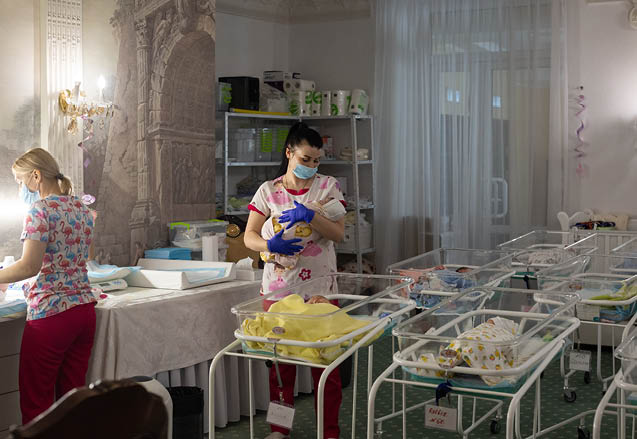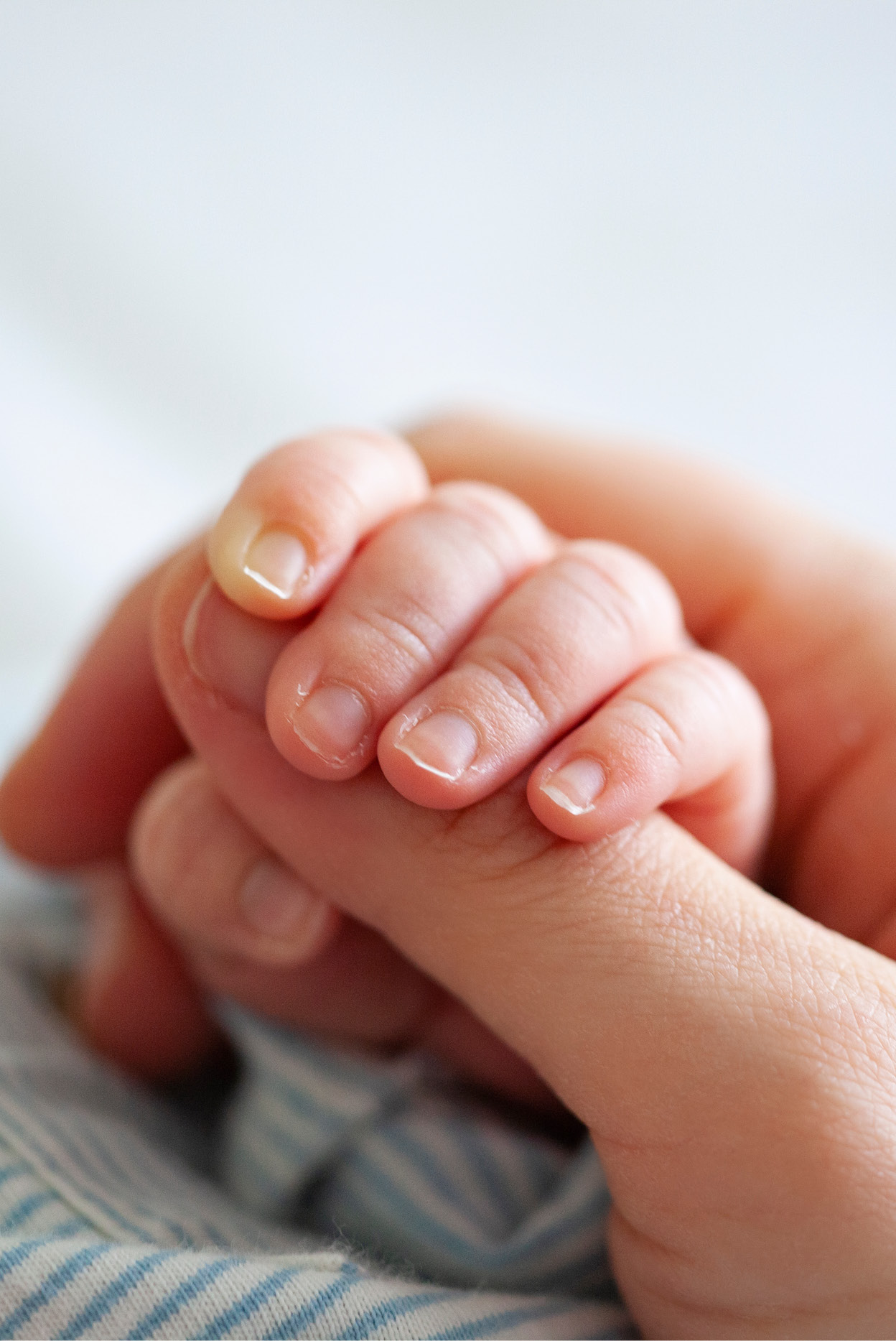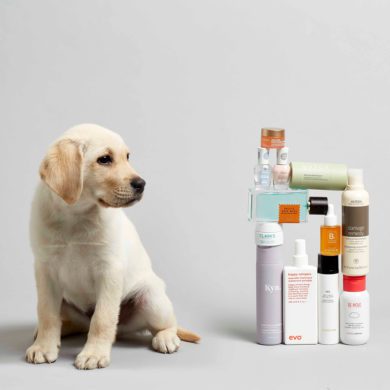As she waited anxiously at a checkpoint on the border between Ukraine and Belarus, Leisha Gauci forced herself to remain calm while officials searched her suitcase and scrutinised her travel documents. Her husband Michael stood next to her, with $US20,000 in cash folded into his bag.
“I was scared and intimidated,” she says. “There were guards with guns and dogs, and I was asking myself, ‘Are we going to get through? Is this even legal?’”
They were tantalisingly close to meeting their newborn son, Jon, who’d been born 10 days earlier via surrogacy in a hospital in the Ukrainian capital, Kyiv. With most borders closed, thanks to Covid-19, this isolated crossing was one of the only ways into the country. Her heart-pounding, Leisha tried not to think of what might happen if they were turned away.
But for now, the couple, who are from Melbourne, were lucky. An English-speaking official was able to translate their paperwork and they were allowed through. Pulling suitcases filled with baby clothes behind them, they set off down the wooded road for the one-kilometre walk through no-man’s land towards Ukraine, and their son.
There were guards with guns and dogs
Sadly, they weren’t the only couple making a journey like this. When coronavirus shut down air travel and closed international borders, hundreds found themselves in the same unexpected and heart-breaking position: they were unable to reach their children born via surrogacy overseas. In countries like Ukraine, Georgia and Russia, where commercial surrogacy is legal, hospital nurseries were filling up with children whose biological parents were stuck on the other side of the world.
“It has been really hard for some of these parents, who haven’t been able to see their newborn children for six or eight weeks,” says Sam Everingham, the founder of Growing Families, an organisation that runs conferences for people interested in overseas surrogacy. Since the start of the Covid-19 crisis, he’s found himself an unofficial ‘fixer’ for couples like Leisha and Michael. “I think I’m dealing with 200 Australian families right now who are dealing with this [issue], or have it coming up.”
Surrogacy has always been a contentious issue, and it made headlines again in May when a Ukrainian surrogacy agency, BioTexCom, released a video showing dozens of crying surrogate babies in rows of cots, waiting for their parents to collect them. The voiceover offers assurances that the babies are being well cared for – the facilities look clean and bright – and that parents are able to facetime the babies regularly. “But it’s heart-breaking to see how much parents miss their little ones,” it adds.

Unsurprisingly, the video ignited fierce debate in Ukraine, which has become one of the main centres for surrogacy. On March 12, the country introduced quarantine and temporarily banned all foreigners from entering, and there have been calls for greater regulation of the industry. For their part, Leisha and Michael were happy with the care they received from their agency, Lotus, and received regular photographs and videos of Jon from them once he was born.
“But I kept thinking, my poor child is lying in a hospital on his own,” says Leisha. “The nurses were fantastic, they were changing him and feeding him, but he wouldn’t have had much contact with anyone. I just wanted to hold him.”
As it is for most couples, surrogacy was a last resort for Leisha and Michael. After struggling to conceive, they had started IVF when Leisha fell pregnant naturally, but miscarried in August 2016.
Then, a couple of weeks later, just before her 39th birthday, she received a shock diagnosis of breast cancer. “I was diagnosed with an invasive ductal sarcoma, which was an aggressive form of breast cancer that had reached the lymph nodes in my left arm,” she says. “I had surgery, then six months of chemotherapy and six weeks of radiation. Because it was an oestrogen-positive cancer, I was told I could never have children.”
With the one embryo they had produced via IVF, the couple started to investigate surrogacy, but were dismayed to discover it was difficult in Australia.
Surrogacy was a last resort
Commercial surrogacy – where a surrogate receives payment beyond the expected medical costs – is illegal, which means prospective parents have to find a women prepared to carry a child altruistically. Neither are they allowed to advertise, meaning they must find someone through their personal networks. In Queensland, New South Wales and the ACT, it’s also illegal to pursue commercial surrogacy overseas.
However, as the Australian Human Rights Commission noted, “the default position is a laissez faire approach”, and parents are typically able to secure citizenship and a passport for their surrogate children.
After attending a conference organised by Sam, Leisha and Michael selected a Ukrainian agency and started the surrogacy process in 2018. Their single embryo was transferred to a surrogate, but she failed to conceive. Using an egg donor, they tried again, and on the second attempt Marina fell pregnant.
Leisha tried to remain sanguine about the process, which has ended up costing them over $100,000. “Pregnancy is never guaranteed and I knew I had to allow myself to lose control of it, if that makes sense,” she says. “I couldn’t control every step, as our surrogate was on the other side of the world. But I did feel afraid in the beginning. I wasn’t sure how I was going to feel, what I’d tell the baby when he grew up, that sort of thing. But it was just the best thing we’ve ever done.”
With the baby due in May, Leisha and Michael had started to prepare to fly out for the birth when the pandemic threw all their plans awry. “I didn’t pay much attention to coronavirus initially and then all of a sudden, one day I saw something on the news and thought, we’re screwed. This is really going to affect us getting to Ukraine,” she says.
I wasn’t sure how I was going to feel
Following advice from the surrogacy agency, Leisha applied to the Australian government for permission to leave the country, while Sam helped organise their drivers and accommodation in Belarus, and other documentation that had been fiendishly complicated by the pandemic.
“You need a visa from the receiving country, permission from the airline to fly, permission from the transit country – say, if you’re flying via Paris or Amsterdam – for an overnight stay, letters from the Australian embassy in Ukraine – there’s so much to organise,” he says. “In many cases, too, my role is to calm down the parents, and when they’re emotional and teary, to be able to tell them they’re going to see their kids.”
By early May, Leisha and Michael were almost ready to fly when they received the news that Jon had been born on May 5, slightly early but healthy. They were desperate to see their son, but didn’t reach Ukraine until May 18. “I was very emotional but my husband was very level-headed,” Leisha says. “He said we just had to do whatever it took to bring Jon home.”
After clearing the final checkpoint into Ukraine, a driver collected them from the border and drove them to their Airbnb apartment. They waited. Finally, late in the afternoon, there was a knock on the door and agency workers handed Leisha her baby boy.
I was very emotional
“I just felt disbelief,” she says, with emotion in her voice. “There he is. He’s here now. And the agency staff were giving me lots of information, as we were in quarantine, and I was trying to listen, but I was just looking at him.”
For the next five weeks, Leisha and Michael stayed in their apartment, first in full quarantine and then waiting for Jon’s Australian citizenship and passport to be issued. As foreigners they’d had to download an app, which required them to send photographs of where they were at random times through the day to ensure they stayed home. They used other apps for food deliveries. But the confinement, while difficult, gave them time to get to know their baby.
“He’s a calm baby and, because he’d been in hospital he was in a feeding routine,” says Leisha. “He’d just fall asleep by himself, without needing cuddles, but I still cuddled him.”
It wasn’t until June 25 that the family touched down in Melbourne – and another two weeks of hotel quarantine before they finally arrived home. Even now, Leisha’s relief is palpable.
“We have so many beautiful friends and family who have given us things, and we had the cot set up so Jon could go straight into that, and we’re home now,” she says. Despite everything, the chaos of the past few months was worth it.
“I can’t believe we’ve done it, that we have a baby. My husband keeps saying, ‘I just cannot imagine my life without him’.”
Want more stories like this? Sign up to PRIMER’s weekly newsletter here.














No Comments